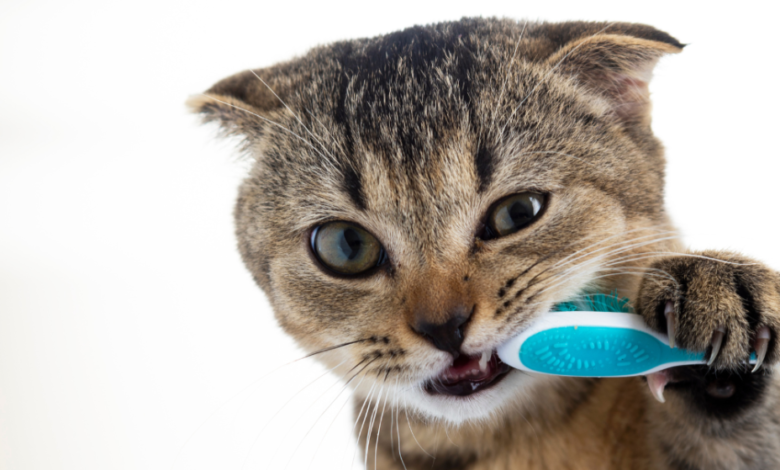Pet Dental Care for Strong Teeth

Maintaining strong teeth and healthy gums in pets is a crucial aspect of their overall well-being. Dental issues, if left untreated, can lead to severe health problems including heart, kidney, and liver complications. In Pakistan, pet owners are becoming increasingly aware of the importance of dental care, and with the availability of high-quality products and services from platforms like , taking care of your pet’s oral health has become more accessible than ever. This guide will help you understand the importance of pet dental hygiene and how to implement an effective dental care routine.
Understanding the Importance of Pet Dental Health
Dental Issues are Common in Pets
Many pet owners underestimate how common dental disease is among pets. By the age of three, most cats and dogs already show signs of periodontal disease. This condition begins with plaque buildup and can progress into inflamed gums, infection, and even tooth loss if not treated.
The Link Between Oral and Overall Health
Dental problems don’t just affect the mouth. Bacteria from infected gums can enter the bloodstream, impacting major organs like the heart, liver, and kidneys. This systemic effect underscores why dental care should be a core part of your pet’s health regimen.
Signs Your Pet May Have Dental Issues
Physical Symptoms You Shouldn’t Ignore
Bad breath is often the first noticeable sign of dental problems. While some odor is normal, especially in dogs, extremely foul breath usually signals a deeper issue. Pets with dental disease may also have difficulty eating, drool excessively, paw at their mouths, or show visible tartar buildup.
Behavioral Changes Due to Oral Pain
Pets experiencing dental discomfort might become irritable or withdrawn. Cats may stop grooming themselves, and dogs may avoid playing with chew toys. These changes often go unnoticed, so routine dental checks are vital.
Creating a Daily Dental Care Routine
Brushing Your Pet’s Teeth at Home
Brushing is the most effective way to reduce plaque and maintain healthy gums. Use a toothbrush designed specifically for pets and a vet-approved toothpaste. Never use human toothpaste, as it contains ingredients harmful to pets. The ideal frequency is daily brushing, but even two to three times a week can make a significant difference.
Starting Gradually and Building Trust
If your pet isn’t used to having their teeth brushed, start slowly. Begin by letting them taste the toothpaste, then move on to gently rubbing their gums with your finger before introducing the toothbrush. This approach reduces stress and builds tolerance.
Using Dental Treats and Chew Toys
Functional Chews That Promote Oral Hygiene
Dental treats are not just tasty—they’re designed to help reduce plaque and tartar through mechanical chewing action. Some even contain ingredients like enzymes or antibacterial agents that target oral bacteria. Ensure the treats you choose are approved by veterinary dental councils for safety and effectiveness.
Choosing the Right Chew Toys
Chew toys can also support oral health. Rubber or nylon toys with textured surfaces help clean teeth while your pet chews. Avoid toys that are too hard, as they could damage teeth, especially for aggressive chewers.
Veterinary Dental Cleanings
Why Professional Cleaning is Necessary
Even with consistent at-home care, plaque and tartar can accumulate in areas brushing can’t reach. That’s where professional dental cleaning comes in. Veterinarians use specialized tools under anesthesia to thoroughly clean below the gum line and assess your pet’s overall oral health.
How Often Should It Be Done?
For most pets, annual dental cleanings are sufficient. However, pets prone to dental issues may require more frequent visits. Your vet will guide you based on your pet’s breed, age, and dental history.
Dietary Support for Strong Teeth
Feeding a Dental-Health-Supportive Diet
Some pet foods are formulated to help maintain oral hygiene. These diets have kibble shapes and textures designed to scrub the teeth as pets chew. Look for products labeled for dental care or ask your veterinarian for recommendations.
The Role of Hydration in Oral Health
Water is essential for oral hygiene. Encourage your pet to drink plenty of clean, fresh water to help wash away food particles and bacteria. A water fountain can entice pets to drink more frequently and stay hydrated.
Oral Rinses and Water Additives
Easy Alternatives for Busy Pet Parents
For pet owners who struggle with brushing, oral rinses and water additives are a convenient option. These products contain antibacterial agents that help reduce plaque buildup and freshen breath. They are simply added to your pet’s drinking water or applied directly to the gums with a swab.
Ensuring Safety and Effectiveness
Always choose products that are formulated specifically for pets. Avoid items with artificial sweeteners like xylitol, which is toxic to animals. Trusted brands listed on reputable pet care sites often include vet-approved oral hygiene products.
Regular Dental Exams and Monitoring
Setting Up a Dental Check-Up Schedule
Schedule routine dental exams with your veterinarian as part of your pet’s overall health plan. During these visits, the vet will examine your pet’s teeth and gums, monitor for early signs of disease, and recommend treatment if needed.
Keeping an Eye at Home
Between vet visits, monitor your pet’s oral health at home. Check their mouth for signs of redness, swelling, bleeding, or bad breath. Keeping a simple journal or digital log of changes in their eating habits or behavior can help you identify potential issues early.
Special Considerations by Breed and Age
Dental Care for Small Breeds and Senior Pets
Small dog breeds and cats are often more susceptible to dental issues because of the structure of their jaws and overcrowded teeth. Senior pets are also at higher risk due to age-related wear and immune changes. These groups may require more intensive dental care, such as more frequent brushing or checkups.
Puppies and Kittens Need Early Introduction
Introducing dental care at a young age helps create a habit and reduces fear. Use soft toothbrushes or finger brushes suitable for young pets and make it a positive, rewarding experience from the start.
Products That Support Dental Health in Pakistan
Trusted Options
Platforms offer a wide range of pet dental care products that suit various pet needs and budgets. These include enzymatic toothpastes, dental chews, mouth rinses, and professional-grade toothbrushes. Shopping locally ensures faster delivery, product authenticity, and access to local customer support.
Choosing the Right Product for Your Pet
Every pet is different. When choosing dental products, consider your pet’s size, breed, and preferences. If your dog dislikes toothbrushing but enjoys treats, opt for dental chews. If your cat prefers a hands-off approach, use water additives or mouth sprays.
Conclusion
Pet dental care is an essential aspect of responsible pet ownership. Strong teeth and healthy gums contribute to your pet’s overall wellness, comfort, and longevity. By integrating daily brushing, using effective dental products, scheduling regular vet cleanings, and monitoring oral health closely, you can protect your pet from painful dental issues and costly treatments in the future.
With convenient access to premium dental care products from platforms , taking care of your pet’s teeth has never been easier. Whether you’re a first-time pet parent or a seasoned caretaker, staying proactive about dental hygiene will ensure your furry friend enjoys a happy, healthy life.


